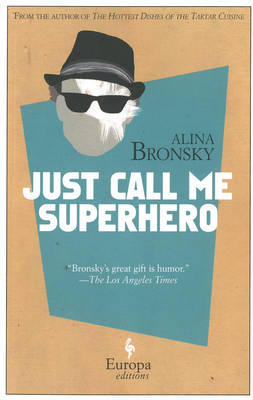If To Mervas is a novel of moving from inside to outside and back again, Alina Bronsky’s Just Call Me Superhero (translated from the German by Tim Mohr) is one of crossing into unfamiliar worlds. It begins with our narrator, Marek, arriving at what he thinks will be a tutorial to help him pass his high school diploma – only to find that his mother has actually sent him to a support group for disabled people. Marek was disfigured after being attacked by a Rottweiler, but he wants nothing to do with any sort of disability group – until, that is, he spots the beautiful Janne sitting there in her wheelchair.
One of the first things I began to notice about Just Call Me Superhero was how tightly controlled was the flow of information about Marek– for instance, we never learn the full story of his disfigurement. We are firmly in the ‘here and now’ of Marek’s life; there is a clear sense of going only as far into his world as he will allow. That’s what it’s like for Marek with the disability group (particularly the frosty reception he gets from Janne), though there’s also reluctance on his part to enter the group and open himself to them.
Bronsky’s novel is effectively structured into two halves, with Marek taking reluctant steps into two of these unfamiliar spheres. In the first half, it’s the disability group; in the second, it is the family of his father, who eloped with the au pair and had a son whom Marek barely knows. Bronsky draws intriguing parallels between the two groups, and one question hangs above all: is there a family for Marek, among all these people?
Book details (Foyles affiliate link)
Just Call Me Superhero (2013) by Alina Bronsky, tr. Tim Mohr (2014), Europa Editions paperback
Read more of my posts for Women in Translation Month.

Recent Comments